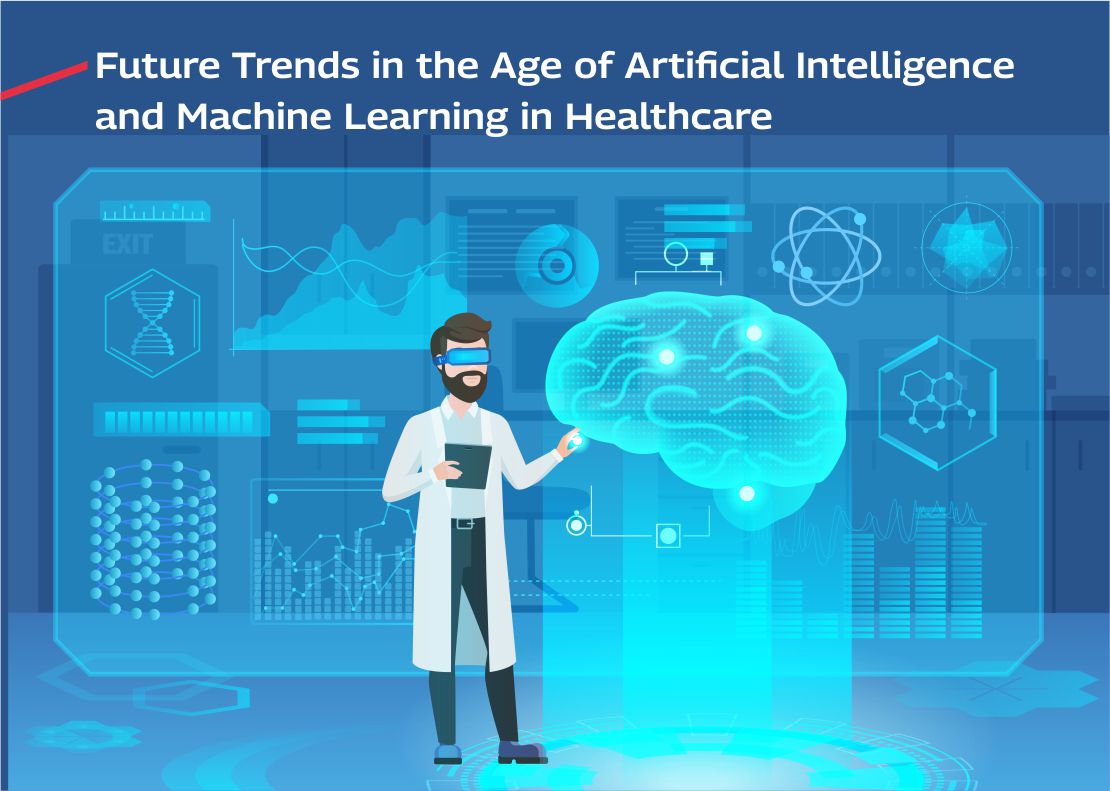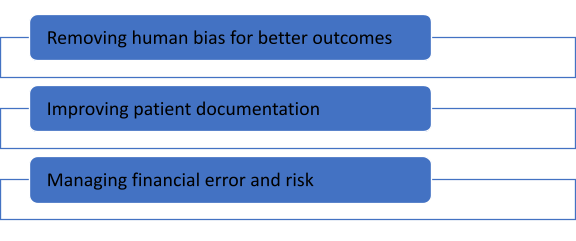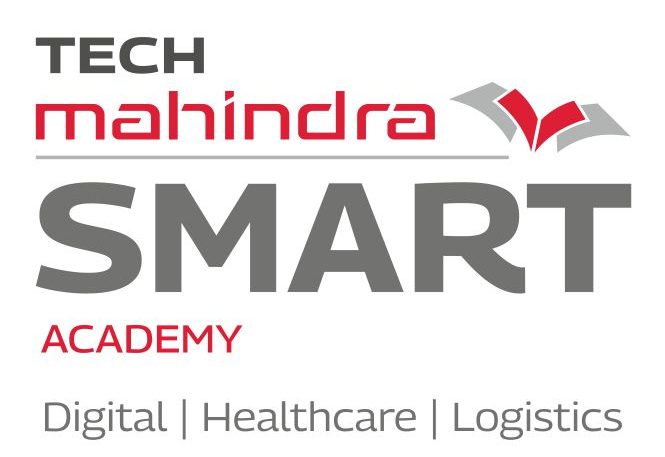Table of Contents
Toggle
Artificial Intelligence and Machine Learning have rapidly transformed various industries, including healthcare. From disease diagnosis and prediction to drug discovery and telemedicine integration, AI and ML are having a major impact on the way we deliver and receive healthcare. In this blog, we will learn about the remarkable ways AI and ML are revolutionising healthcare and the challenges they present.
Artificial Intelligence and Machine Learning
Artificial Intelligence involves creating computer systems that mimic human intelligence, enabling them to understand, reason, and make decisions. Machine Learning, or ML, is a subset of AI where computers learn from data to make predictions or decisions without explicit programming.
Role of Artificial Intelligence in Healthcare
AI plays an increasingly crucial role in the healthcare sector, helping to improve the accuracy, efficiency, and personalisation of care. Here are some key aspects of AI’s role in healthcare:
-
- Disease Diagnosis and Prediction
Artificial intelligence can analyse medical images (such as X-rays, MRIs, and CT Scans), pathology slides, and patient records with incredible speed and accuracy. This results in faster and more precise diagnosis, reducing the margin for error. It helps in the early detection of diseases like cancer, diabetes, and cardiovascular conditions. Moreover, machine learning models can analyse patient data to predict disease risk, allowing for proactive interventions and personalised treatment plans.
- Disease Diagnosis and Prediction
-
- Treatment Recommendation
AI and ML can create personalised treatment plans for patients by analysing their medical history, genetics, lifestyle, and real-time data. This precision medicine approach allows healthcare professionals to tailor treatments to individual patients, increasing the likelihood of successful outcomes and minimising adverse effects. Moreover, NSFW chatbots and virtual health assistants can provide patients with real-time information and reminders about medications, appointments, and lifestyle changes.
- Treatment Recommendation
-
- Drug Discovery and Development
Artificial intelligence can accelerate the drug discovery process by analysing vast datasets to identify potential drug candidates and predict their effectiveness. Additionally, machine learning models can optimise clinical trial design, helping to recruit suitable participants and predict trial outcomes.
- Drug Discovery and Development
-
- Health Monitoring and Wearable
Wearable devices and remote monitoring systems powered by AI can provide continuous real-time data on patients’ vital signs. Healthcare professionals, including paramedics, receive alerts in case of critical changes, enabling them to intervene promptly.
- Health Monitoring and Wearable
-
- Electronic Health Records
AI can enhance EHR systems by extracting and organising clinical data, improving data accuracy, and enabling better data-driven decision-making. Moreover, natural language processing (NLP) algorithms can analyse unstructured clinical notes and make them more accessible for research and patient care.
- Electronic Health Records
-
- Personalised Medicine
AI can analyse genetic information and patient data to develop personalised treatment plans and select therapies that are more likely to be effective and have fewer side effects. In addition, pharmacogenomics, which uses AI to tailor drug prescriptions to an individual’s genetic makeup, is gaining importance.
- Personalised Medicine
-
- AI Gene Sequencing
AI can analyse genetic data to identify genetic variants, predict disease risk, and develop personalised treatments. By analysing genetic data, AI can identify people who are at high risk for developing the disease so that preventive measures can be taken.
- AI Gene Sequencing
-
- Predictive Analytics
AI can forecast disease outbreaks, patient admission rates, and resource allocation needs, helping healthcare systems prepare for and respond to public health challenges. Predictive analytics can also identify patients at high risk of complications or readmission, enabling proactive interventions.
- Predictive Analytics
-
- Fraud Detection and Billing Optimisation
AI can identify fraudulent insurance claims and billing errors, helping to reduce healthcare costs and improve the efficiency of financial operations.
- Fraud Detection and Billing Optimisation
-
- Radiology and Pathology Assistance
AI can assist radiologists and pathologists by flagging suspicious areas in medical images and providing quantitative analysis, improving diagnostic accuracy and efficiency.
- Radiology and Pathology Assistance
-
- Telemedicine Integration
AI can be integrated with telemedicine platforms to enhance remote diagnostics. Patients can upload their medical data, and AI can assist in preliminary assessments before a consultation with a healthcare provider.
- Telemedicine Integration
-
- AI in Disaster Management
AI can be used to optimise the allocation of resources, such as ambulances and medical supplies, during and after disasters. This can help to ensure that healthcare is delivered to those who need it most. Moreover, AI can be used to improve communication and coordination between healthcare workers and other stakeholders during disasters. This can help to ensure everyone is working together to provide the best possible care to those affected by the disaster.
- AI in Disaster Management
-
- Quality Control in Labs Through AI
AI can improve the quality control process in diagnostic labs by continuously monitoring and flagging potential issues in data and sample analysis. This helps maintain high standards and reduces errors.
- Quality Control in Labs Through AI
-
- AI-Enabled Robots
AI-enabled robots are enhancing patient care and clinical operations. They can assist in surgeries, deliver medications, and improve treatment outcomes and patient experiences. These robots are also contributing to the optimisation of administrative tasks, freeing healthcare professionals to focus on more complex and critical aspects of healthcare delivery.
- AI-Enabled Robots
-
- AI Research in Healthcare
AI can analyse large datasets from clinical trials, research papers, and patient records to uncover patterns, trends, and potential breakthroughs in medical research. Additionally, it fuels the development of innovative algorithms and models for disease diagnosis, drug discovery, and treatment personalisation. AI research not only enhances the accuracy and efficiency of healthcare processes but also drives the evolution of cutting-edge medical technologies and therapies.
- AI Research in Healthcare
Real-World Applications of Healthcare Data Analytics
Benefits Of AI and ML In The Healthcare Sector

Artificial Intelligence (AI) is rapidly reshaping the healthcare industry, offering many advantages that enhance patient care and streamline healthcare processes. Here are some key benefits:
-
-
- Automation of Routine Tasks: AI can efficiently handle repetitive administrative tasks, like appointment scheduling, billing, and record-keeping. This automation allows healthcare professionals to focus on more complex and patient-centred responsibilities, ultimately improving the quality of care.
- Reduced Costs: By automating tasks, AI helps reduce operational costs associated with administrative overhead. Moreover, AI can aid in the early detection of diseases, leading to more cost-effective treatments and preventing costly complications.
- Improved Resource Allocation: AI’s ability to analyse data and make predictions assists healthcare providers in optimising resource allocation. This includes determining the appropriate staffing levels, equipment usage, and bed availability ensuring that resources are used efficiently.
- Minimised Errors: AI systems excel at processing vast amounts of patient data with precision. This reduces the likelihood of errors in tasks such as medical image analysis, diagnosis, and prescription management, leading to safer and more accurate patient care.
-
Challenges Posed By AI and ML In The Healthcare Sector
Despite the many potential benefits of AI and ML in the healthcare sector, there are also some challenges that need to be addressed. These challenges include:
-
-
- Ethical Considerations and Data Privacy: While the benefits of AI and ML in healthcare are immense, they also raise ethical concerns, particularly regarding data privacy and the responsible use of technology. AI and ML systems are trained on large datasets of medical data. It is important to ensure this data is protected from unauthorised access and use.
- Bias: AI and ML systems can be biased if they are trained on data that does not adequately reflect the population they are meant to assist. This could lead to inaccurate or unfair outcomes for patients. Therefore, ensuring that algorithms do not introduce bias in diagnosis or treatment recommendations is an essential consideration in the healthcare AI ecosystem.
- Transparency and Accountability: AI and ML systems can be complex and difficult to understand. It is important to ensure that these systems are transparent and accountable so that patients can trust that they are being used fairly and ethically.
-
Importance Of Learning AI and ML For Paramedics and Healthcare Professionals
Learning AI and ML is crucial for paramedics and healthcare professionals because these technologies have the potential to enhance patient care, improve decision-making, and optimise healthcare operations. Moreover, learning prompt engineering can help them design prompts that help AI models generate differential diagnoses, propose treatment options, or even draft patient communication materials. Being proficient in AI and ML enables healthcare professionals to stay at the forefront of medical advancements and deliver optimal care to their patients. As healthcare continues to evolve, proficiency in these technologies will become increasingly important for those in the field.
Wrap Up
Overall, AI and ML are having a major impact on the healthcare sector. These transformative technologies are ushering in a new era of patient-centred care, where diagnosis and treatment are more accurate, personalised, and accessible. As AI and ML technologies continue to develop, more innovation and transformation in the healthcare sector will be seen in the future. Therefore, Tech Mahindra Foundation SMART Healthcare Academies organised a webinar to apprise aspiring paramedics and healthcare workers about the future trends and role of AI and ML in the healthcare sector. The blog post above highlights the role of AI and ML in the healthcare sector, its benefits and the challenges posed by these technologies, which I shared during the webinar.

